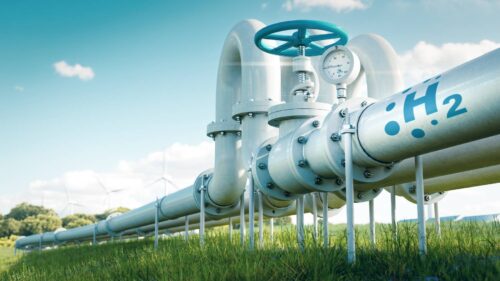
RMI Releases Report that Maps a Viable 2030 Renewable Hydrogen 100 GW Roadmap for China
RMI demonstrates the necessity and feasibility of installing 100 GW of green hydrogen electrolyzers by 2030
Beijing, China – September 27, 2022
Today, RMI releases its latest report China’s Green Hydrogen New Era: A 2030 Renewable Hydrogen 100 GW Roadmap. In alignment with China’s carbon-neutral oriented green hydrogen (also known as renewable hydrogen) target, the report finds out that it is necessary and feasible to realize a 100 GW green hydrogen target by 2030 to both scale the production and utilization and establish a premature supply chain for long-term development acceleration. The report also provides a deep dive into pathways to fulfill such targets from the sector and regional perspectives.
Under China’s ambitious policy scheme of carbon neutrality by 2060, hydrogen, especially green hydrogen, has been highlighted as one of the most significant solutions for driving energy transition in heavy industry and heavy-duty transport sectors. In addition, the March 2022 official release of the “Medium- and Long-Term Plan for the Development of the Hydrogen Energy Industry (2021–2035)” centered renewable energy-based hydrogen production at the core of long-term development of the hydrogen industry.
To support China’s carbon-neutral oriented green hydrogen target and the “Medium- and Long-Term Plan for the Development of the Hydrogen Energy Industry (2021–2035),” the report did an in-depth analysis on China’s current hydrogen industry development status, with a focus on the scale and position of China’s renewable hydrogen under the carbon neutrality goal. It systematically provides a roadmap to reach 100 GW of renewable hydrogen by sectors and regions, and provides suggestions for facilitating the efficient development of China’s hydrogen industry.
Given that green hydrogen requires renewable power for its production, and heavy industry is the primary sector for hydrogen utilization, the report identifies that renewable energy mega bases will be critical for green hydrogen development. China’s Northwest region is expected to become the largest green hydrogen producer (24 GW) for its abundant renewable energy resource and traditional coal-based industry’s decarbonization demand.
Key insights of the report include:
- Industries and regions in China have the potential to install at least 100 GW of accumulated renewable hydrogen capacity by 2030 — an important milestone on the way to carbon neutrality by 2060.
- The growth of China’s demand for renewable hydrogen by 2030 lies mainly in the replacement of traditional fossil-based hydrogen production in the chemicals sector and new demand created by technological breakthroughs in the steel and transportation sectors.
- Renewable hydrogen production in 2030 will be concentrated in Northwest China, which has rich renewable resources, and in North China and East China, where hydrogen is in high demand from industry.
- It is essential to reduce the cost of various elements in the hydrogen industry through a strong, large-scale demonstration of the hydrogen valley model and by improving renewable hydrogen industry planning for local development conditions.
- China’s strategic development of the hydrogen industry requires a phased approach to maximize emissions reductions by using the complementarity of different hydrogen sources.
“Many countries in the world have set up green hydrogen strategy for energy transition and economic growth. As the largest hydrogen producer and consumer in the world, China has issued a series of policy documents to solidify hydrogen’s role in energy system, which triggered massive privative sector actions on green hydrogen pilot adoption. The 100 GW target strengthens the sector’s confidence on accelerating green hydrogen promotion, and will demonstrate a strong case for driving global hydrogen development. RMI expects to closely collaborate with stakeholders to accelerate green hydrogen utilization and facilitate the global zero-carbon transition,” said Ting Li, Managing Director and Chief Representative of Beijing Office, RMI.
Media Inquiries please contact:
RMI: Danielle Li, dli@rmi.org.